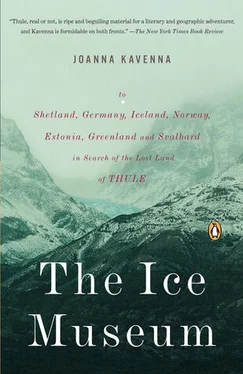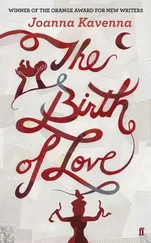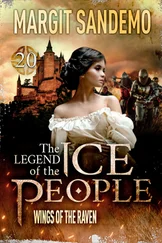The restaurant was filling up, but as Ursula sauntered through the door of the restaurant she looked six feet tall, imposing as she moved in high heels, dropping her coat into the arms of a waiter.
‘Hello.’
‘Hello.’
We nodded, we sat down; there was a curious air to the encounter, as if we were meeting in secret. Without any preamble, without ordering anything to drink or eat, she started talking.
‘Everything is in darkness,’ she said. ‘It remains in darkness, it will always remain in darkness,’ she said. ‘Sebottendorff was a dubious man. A much-travelled adventurer. He had affairs, he lived in Turkey; he dabbled in Sufism, alchemical and Rosicrucian texts, he took Turkish nationality, he was accused of bigamy and of marrying for money. He was obsessed with the esoteric. The Thule Society had all of his chaos and obscurity.
‘Sebottendorff said Thule was found by Pytheas in around 400 B.C.; Thule was probably Iceland, Sebottendorff thought. He knew Thule had been discussed as a real place. He knew Iceland was where the Sagas were set. The Sagas, he said, had made possible the development of the Germanic religion.’
We were sitting in the Hofbrauhaus, another place where Hitler had delivered speeches. The ceilings were plastered with paintings of pigs and platters, knives and forks. Women in Bavarian costume were moving between the tables, delivering mugs of beer and plates of food. In the beer garden the checked tablecloths were flapping in the breeze and a fountain trickled water. The doors of the restaurant swung open, and the sound of a brass band drifted across the court-yard. Ursula seemed not to notice. She screwed her eyes up against the sun. She fumbled in her bag for sunglasses. Then she spent a long time trying to light a cigarette. Shaking the lighter and inhaling, she said: ‘You said you knew something about Thule. But these Germans, these Thule Society members, they took this idea of a last land in the north and made it the cradle of German history.’ She paused briefly, and a waiter approached. ‘Coffee,’ she said.
‘The Aryans, they thought, had knowledge of the magical power of the runes. The old runes,’ said Ursula. ‘As well as Hitler, Hess and Rosenberg, the other members and associates included Johannes Hering, Hermann Pohl, Theodor Fritsch, all anti-Semites, members of the Münchener Hammer-Gemeinde, the Wotan Lodge; they were all obsessed with the Sagas. All were listed by Sebottendorff as members of the Thule Society,’ she said. ‘Hering called the Thule Society “ die Treffpunkt ”—the meeting place. It’s even confusing who was a member and who wasn’t. Sebottendorff lied about everything. The Nazis Wilhelm Frick and Julius Streicher were named as members, also the publisher Gottfried Feder. In some accounts the chief of police was mentioned, and the Oberbürgermeister. Aristocrats, top officials, political agitators, millionaires. But the Thule Society was perhaps one of many small, unpleasant groups they joined.’ The coffee came and Ursula drank it down.
‘And a member of your family was also a member?’ I asked.
She tapped her fingers on the table, a gesture of irritation, perhaps. ‘We don’t know. I said the lists are not reliable. It is possible, unlikely but possible. I don’t think it is worth talking too much about,’ she said, quietly. ‘An ancestor of mine saw the Thule Society crest among her husband’s papers a few times. But after the death of her husband, she went through his effects and never found it. By then it was the late 1920s; he might of course have lost these papers, or burnt them. He might just have been approached by the Thule Society and never actually signed up. I really don’t know. It was the sort of society he might have joined, from what we know about this man. You of course understand that if you start rummaging through family histories in Germany you often find compromised figures, figures who allied themselves with all of this.’ She said “this” with a curl to her lips.
‘Could someone have attended meetings without realizing what the Thule Society was really about?’ I asked.
‘Unlikely,’ she said, briskly. ‘Sebottendorff used to give lectures blaming the Jews for the revolution in Bavaria. He spoke like this: “Our order is a German order. . . . Our God is Walvater; his rune is the Ar-rune. The Ar-rune means Aryan, primal fire, the sun, the eagle.” A few years later this was the sort of language used by the SS. And later there was an element of planning that went on at these meetings.’
After Eisner’s death the elected government fled, replaced for a short time by a collection of anarchists and afterwards by Communists, who declared Bavaria a Soviet republic. There were skirmishes between Freikorps soldiers and the Bavarian Soviets, and the Thule Society had links with the Freikorps. Their offices were raided, and some Thule Society members were captured and shot by the Communists in April 1919. Sebottendorff hailed them as martyrs; he later claimed they were the first people to die in the cause of Nazism.
The Thule Society began to decline, even as its members prospered. One of the founders of the German Workers’ Party, Karl Harrer, was a Thule Society member, but once he created his own group he left the Sebottendorff circle. By the late 1920s Thule Society members were a mere handful, and by 1930 the society had disintegrated entirely. Sebottendorff lost influence over the Thule Leute , and was dropped by his own members. He disappeared in the 1920s, roaming around the world again, as he had done as a younger man. He was bitter about their betrayal even in 1933, when he published his autobiographical account, Before Hitler Came, long after the Thule Society had become irrelevant. I had read his autobiography in the Bavarian State Library, a book printed in a typescript so Gothic the words seem to be trying to contort themselves off the pages. Sebottendorff’s writing style was littered with archaisms, sudden explosions into ranting and blatant exaggeration. ‘The Thule People died as the first sacrifices for the Swastika,’ he wrote. ‘The Thule people were those to whom Hitler first came, and the Thule People were those with whom Hitler first allied himself.’ Sebottendorff struggled to prove he had created Nazism, listing the key Nazis who had formerly been Thule Leute . In Sebottendorff’s version of history the Thule Society had been cruelly cast aside as the German Workers’ Party became more powerful. With his self-hagiography, Sebottendorff tried to airbrush himself into history.
Sebottendorff’s insistence on the origin of all things Nazi in the Thule Society was an unwise political move by 1933. The second edition of his book was confiscated by the Nazis; he was arrested by the SS, and encouraged to leave Germany. He disappeared on another global tour, arriving in Turkey, where he stayed.
‘Sebottendorff lived out the war in Istanbul,’ said Ursula. ‘At least that’s what I think. He drowned in the Bosphorus on 9 May 1945, shortly after the end of the war. Most likely he had killed himself.’ She stubbed out the cigarette. ‘You would, I suppose, if you had supported the Nazis in everything, even after they cast you out. If you believed, really believed, that you had created the movement which had died in the dust of Berlin. And he knew there was nothing for him once Nazism was over. His life was over. Ironically, you might call him one of Hitler’s most loyal supporters, though Hitler had discarded him.’
We shook hands in the beer garden, squinting at each other in the brightness. ‘You could go to the Residenz,’ said Ursula. ‘The riches are amazing. You see what the Nazis coveted; you see their longing for castles and palaces.’ She walked away. As she pushed through into the beer hall, the sound of cheers and roars echoed around the cloisters, then the door swung back again and the sound died.
Читать дальше












